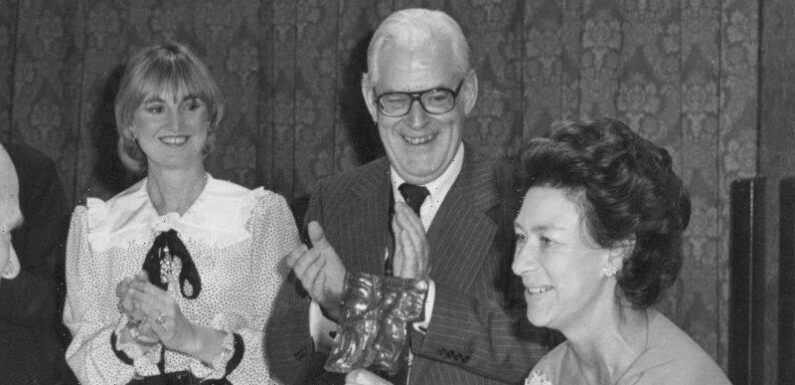
In wartime Britain, only months after the Blitz, radio producer Roy Plomley woke up in the middle of the night and jotted down an idea for a program: a guest nominates their favourite music and chats about their life. To that simple formula he added a curious twist – the guest had to imagine they were a castaway stranded on a desert island with eight records and a record player, or as they put it, “a gramophone”.
Roy Plomley, the creator and presenter for decades of Desert Island Discs.Credit:
The first edition went to air on the BBC Forces Program in January 1942 and now, eight decades and several thousand castaways later, the program’s archives constitute arguably the greatest treasure trove of cultural conversations in history. The program each week has over 2 million listeners, and with more than 2400 episodes available online reaches a wider audience than ever.
BBC editor John Goudie, who has been working on Desert Island Discs for seven years, effortlessly reels off significant episodes of the show from Field Marshal Montgomery and Archbishop Desmond Tutu to Cate Blanchett and George Michael.
John Goudie: something happens when people hear the music.Credit:BBC
“George Michael in 2007 is a fantastic conversation,” Goudie says. “Very funny, very open. Michael Parkinson presented the program for a couple of years and his conversation with (American writer and activist) Maya Angelou is great, just to hear her voice, her story and her musical choices is really compelling.
“Due to the TV series The Crown there’s been a lot of interest in Princess Margaret’s appearance on the program (in 1981). She’s the most senior in terms of closeness to the monarch, the most senior royal to appear on the program. The TV drama featured a sequence which had very strong echoes of her appearance on Desert Island Discs.”
Plomley liked to ask his guests how they would fare on a desert island, how proficient they were at constructing shelter and seeking out food, how they would cope with the solitude and what book and “luxury item” they wanted to bring.
Five castaways worth catching
Desmond Tutu, 1994
The Anglican Archbishop of Capetown and Nobel Peace Prize winner speaks just months after South Africa’s historic first general election. He admits he would be totally useless building a shelter and nominates USA for Africa’s We Are the World among his favourite tracks.
Cate Blanchett, 2022
Having played a conductor in Tar, the Australian actor features a couple of classics in her list composed by Mahler and Richard Wagner. There’s still room for Go Tell the Women by Nick Cave and Warren Ellis’ Grinderman outfit.
Alec Guinness, 1960, 1977
A long time ago, before anyone has heard of a galaxy far, far away, Alec Guinness discusses his first roles on stage with John Gielgud and how he turned his nose up at films until Great Expectations came along. He returns for a second castaway experience when Star Wars is first released.
Liberace, 1960
The pianist explains that on a desert island he would be more afraid of bugs than wild animals. He also tells Plomley why his attire had become increasingly flamboyant.
Kate Moss, 2022
The supermodel was famously reluctant to do interviews. British newspapers remarked on how thanks to Desert Island Discs now we know what her voice sounds like.
One early episode, sadly not in the audio library but recorded by typed transcript, featured a real-life castaway Captain A.E. Dingle who in his 22 years as a mariner managed to get shipwrecked five times, including a three-month spell on an island in the Indian Ocean where the crew survived eating rabbit, goat and fish before being rescued by a French sailing ship.
Not all guests were as ready for the inquest as Captain Dingle. Goudie recommends an episode with legendary Hollywood director Otto Preminger who gets increasingly annoyed with the castaway questions. Plomley notes that every one of Preminger’s musical selections is from one of his own movies.
Musical tastes have changed across the decades – classical music was far more prominent in early selections than now – and so have interview styles. An interview in 1958 with the concert pianist Hephzibah Menuhin illustrates the point, Goudie says. Born in the US, at the age of 17 she married a fabulously wealthy Australian, Lindsay Nicholas, heir to the Aspro pharmaceutical empire. She dropped plans to play Carnegie Hall to move to his Western Districts property in Victoria where she lived for the next 13 years until the marriage failed.
“But there’s nothing about that in her Desert Island Discs,” Goudie says. “If someone got married at the age of 17, left their whole world behind to live somewhere remote, our listeners now would definitely expect that question to be asked. ”
These days the program is presented by Lauren Laverne, the former lead singer of alternative rock band Kenickie. Her approach may sound more relaxed than Plomley’s original carefully scripted style but, Goudie says, the heart of the program remains the same.
“There’s something that happens when people hear the music and remember and discuss their lives in the context of these eight discs, you can get something very special,” he says. “It happened in a number of the very early programs and it still happens today. ”
To listen to episodes go to bbc.co.uk/sounds and search for “Desert Island Discs”.
BBC Podcasts Premium has just launched in Australia on Apple Podcasts offering ad-free early access to shows like In Our Time and The Infinite Monkey Cage.
Find out the next TV, streaming series and movies to add to your must-sees. Get The Watchlist delivered every Thursday.
Most Viewed in Culture
From our partners
Source: Read Full Article

